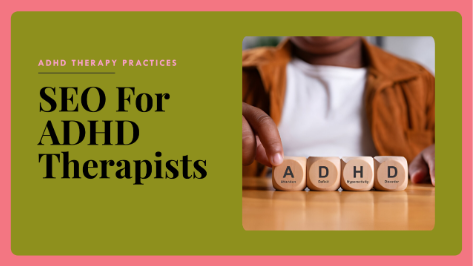For ADHD therapy practices, visibility on search engines is crucial for attracting new clients and growing a successful practice. With more people searching for ADHD-related support online, implementing an effective SEO strategy ensures that your services are easily discoverable.
In this guide, we’ll explore the best strategies for SEO for ADHD therapy practices, including keyword optimization, local SEO, content marketing, and technical improvements that can help your website rank higher in search results.
For expert SEO solutions tailored to mental health professionals, visit Mental Health IT Solutions (MHIS).
Why SEO is Essential for ADHD Therapy Practices
A well-optimized website allows ADHD therapy practices to connect with potential clients searching for services online. Without SEO, your practice might remain invisible to those who need your expertise the most.
Key Benefits of SEO for ADHD Therapy Practices:
- Increased Visibility: Appear at the top of search engine results for ADHD-related queries.
- Higher Client Engagement: Drive organic traffic to your website and increase inquiries.
- Credibility & Authority: Establish your practice as a trusted source in ADHD therapy.
- Cost-Effective Growth: SEO provides long-term benefits without the high costs of paid ads.
Learn more about why SEO is crucial for mental health professionals.
Keyword Research: Targeting the Right Clients
Choosing the right keywords ensures that your website attracts the right audience—people actively looking for ADHD therapy services.
Steps to Effective Keyword Research:
- Identify high-intent keywords like “ADHD therapy near me” or “best ADHD therapists.”
- Use long-tail keywords such as “ADHD counseling for adults” or “how to find an ADHD therapist.”
- Optimize for local SEO keywords by including city or region-specific terms.
For more on keyword optimization, check out this guide on SEO for mental health therapists.
On-Page SEO for ADHD Therapy Websites
Your website structure and content must be optimized for both search engines and user experience.
Key On-Page SEO Elements:
- Title Tags & Meta Descriptions: Include ADHD-related keywords naturally.
- Header Tags (H1, H2, H3): Organize content for readability and SEO.
- URL Optimization: Use clean, keyword-rich URLs like “/adhd-therapy-services.”
- Internal Linking: Guide visitors to relevant pages within your site.
Explore best practices for mental health website development.
Local SEO: Attracting ADHD Clients in Your Area
Since therapy practices often serve local communities, optimizing for local SEO is essential.
Key Local SEO Strategies:
- Google My Business (GMB) Optimization: Ensure your listing is complete with updated contact details, business hours, and reviews.
- Citations & Directory Listings: List your practice on sites like Psychology Today and TherapyDen.
- Location-Based Keywords: Use terms like “ADHD therapist in [city]” to rank locally.
- Encourage Reviews: Positive reviews boost your credibility and local rankings.
Learn more about local SEO for mental health therapists.
Content Marketing: Engaging and Educating Potential Clients
Regularly publishing high-quality content improves search rankings and establishes your expertise.
Effective Content Strategies:
- Educational Blog Posts: Write articles on ADHD management, therapy techniques, and parenting strategies.
- FAQs Pages: Answer common ADHD-related questions to improve search visibility.
- Videos & Infographics: Create visual content to engage different types of audiences.
- Case Studies & Success Stories: Build trust by showcasing patient experiences (with permission).
For inspiration, check out content marketing strategies for mental health clinics.
Technical SEO: Optimizing Website Performance
Search engines prioritize websites that provide fast, secure, and mobile-friendly experiences.
Technical SEO Improvements:
- Mobile Optimization: Ensure your site is responsive on all devices.
- Fast Loading Speeds: Compress images and use caching for quicker page loads.
- SSL Security: Secure your site with an HTTPS certificate.
- Schema Markup: Add structured data to improve search engine understanding.
Discover more about website optimization for therapists.
Link Building: Strengthening Your Website’s Authority
Building backlinks from reputable sources improves your website’s credibility and rankings.
Effective Link Building Strategies:
- Guest Blogging: Contribute to mental health blogs.
- Partnerships: Collaborate with ADHD coaches, schools, and advocacy groups.
- Press Releases: Announce new services or community events.
For guidance on digital branding, explore branding strategies for mental health therapists.
Tracking SEO Performance: Measuring Success
To continuously improve your SEO for ADHD therapy practices, monitoring key performance metrics is essential.
Key SEO Metrics to Track:
- Organic Traffic: Measure the number of visitors from search engines.
- Keyword Rankings: Track your position for ADHD-related search terms.
- Conversion Rates: Monitor how many visitors book appointments.
- Bounce Rate: Identify pages where visitors leave quickly.
Explore how to boost your clinic’s online visibility.
FAQs on SEO for ADHD Therapy Practices
Q1: How long does it take for SEO to show results?
A: SEO is a long-term strategy. You may start seeing improvements in 3-6 months, with significant results in 6-12 months.
Q2: What are the most important keywords for ADHD therapy practices?
A: High-intent keywords include “ADHD therapist near me,” “ADHD counseling for adults,” and “child ADHD therapy.”
Q3: Should I invest in paid ads alongside SEO?
A: While SEO provides long-term benefits, running PPC (pay-per-click) ads can generate immediate traffic.
Conclusion
Implementing SEO for ADHD therapy practices is essential for growing your online presence, attracting more clients, and establishing credibility in the mental health space. By focusing on keyword research, local SEO, content marketing, and technical optimization, you can significantly improve your website’s visibility and reach the right audience.
For professional SEO and digital marketing solutions, visit Mental Health IT Solutions (MHIS).







